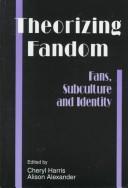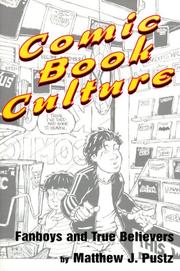| Listing 1 - 8 of 8 |
Sort by
|
Book
ISBN: 1613984898 Year: 2016 Publisher: Los Angeles, CA : BOOM! Studios,
Abstract | Keywords | Export | Availability | Bookmark
 Loading...
Loading...Choose an application
- Reference Manager
- EndNote
- RefWorks (Direct export to RefWorks)
Book
ISBN: 9780786443475 Year: 2010 Publisher: Jefferson MacFarland
Abstract | Keywords | Export | Availability | Bookmark
 Loading...
Loading...Choose an application
- Reference Manager
- EndNote
- RefWorks (Direct export to RefWorks)
"In the 1950s and '60s, a grassroots movement arose to celebrate comic books and strips. Profiled here are 90 people at the heart of the movement, from dealers to convention organizers to fanzine publishers. Also listed are the writers, artists, and industry professionals who have helped build an ever-growing movement of pop culture"--Provided by publisher.
Cartoonists --- Comic book fans --- Comic books, strips, etc --- Collectors and collecting --- Publishing --- History --- History and criticism
Multi
ISBN: 9783030736361 9783030736378 9783030736385 9783030736354 3030736369 3030736369 Year: 2021 Publisher: Cham Springer International Publishing, Imprint: Palgrave Macmillan
Abstract | Keywords | Export | Availability | Bookmark
 Loading...
Loading...Choose an application
- Reference Manager
- EndNote
- RefWorks (Direct export to RefWorks)
This book examines the scope and nature of Donald Duck and his family's popularity in Germany, in contrast to the diminished role they play in America. This is achieved through examination of the respective fan communities, business practices, and universality of the characters. This work locates and understands the aspects of translation and adaptation that inform the spread of culture that have as yet been underexplored in the context of comic books. It represents a large-scale attempt to incorporate adaptation and translation studies into comics studies, through a lens of fan studies (used to examine both the American and German fan communities, as well as the work of Don Rosa). This work builds on the efforts of other scholars, including Janet Wasko and Illaria Meloni, while expanding the historical understanding of what might be the worlds best-selling comics. Peter Cullen Bryan is Lecturer at Pennsylvania State University, USA. His areas of study include American Studies, Intercultural Communications, and 21st Century American culture, emphasizing comic art and fan communities. His research has appeared in the Journal of Fandom Studies, The Journal of American Culture, and Popular Culture Studies Journal. He serves on the boards of the Mid-Atlantic Popular Culture Association and the Popular Culture Association, as well as Secretary for the Intercultural Communication section of the International Communication Association.
Sociology of culture --- populaire cultuur --- Disney characters. --- Comic books, strips, etc. --- Comic book fans --- Translating. --- Duck, Donald
Book
ISBN: 9780824872687 9780824872694 Year: 2024 Publisher: Honolulu University of Hawaiʻi Press
Abstract | Keywords | Export | Availability | Bookmark
 Loading...
Loading...Choose an application
- Reference Manager
- EndNote
- RefWorks (Direct export to RefWorks)
"Transfiguring Women in Late Twentieth-Century Japan: Feminists, Lesbians, and Girls' Comics Artists and Fans examines three dynamic and overlapping communities of women and adolescent girls who challenged Japanese gender and sexual norms in the 1970s and 1980s. These spheres encompassed activists in the uman ribu (women's liberation) movement, members of the rezubian (lesbian) community, and artists and readers of queer shojo manga (girls' comics). Individually and collectively, they found the normative understanding of the category "women" untenable and worked to redefine and expand its meaning by transfiguring ideas, images, and practices selectively appropriated from the "West." They did so, however, while remaining firmly fixed on the local. Thus, for many, this ostensibly Western focus was not a turn away from Japan but integral to their understanding of being a woman within Japan. Following broad historical overviews of the uman ribu, rezubian, and queer shojo manga spheres, the book takes a deeper look through the lenses of terminology, translation, and travel to offer a window onto how acts of transfiguration reshaped what it meant to be a woman in Japan. The work draws on a vast archive that encompasses early twentieth-century dictionaries, sexology texts, and literature; postwar women's and men's magazines and pornography; translated feminist and lesbian texts; comics and animation; and newsletters, fanzines, and other heretofore largely unexamined ephemera. The volume's characterization of the era is also greatly enriched by interviews with more than sixty individuals. Transfiguring Women in Late Twentieth-Century Japan demonstrates that the transfiguration of Western culture into something locally meaningful had tangible effects beyond newly (re)created texts, practices, images, and ideas within the uman ribu, rezubian, and queer shojo manga communities. The individuals and groups involved were themselves transformed. More broadly, their efforts forged new understandings of "women" in Japan, creating space for a greater number of public roles not bound to being a mother or a wife, as well as a greater diversity of gender and sexual expression that reached far beyond the Japanese border"--
Feminism --- Sex role --- Women in popular culture --- Lesbians --- Comic book fans --- Queer comic books, strips, etc --- History

ISBN: 157273115X 1572731141 9781572731141 9781572731158 Year: 1998 Publisher: Cresskill (N.J.): Hampton press,
Abstract | Keywords | Export | Availability | Bookmark
 Loading...
Loading...Choose an application
- Reference Manager
- EndNote
- RefWorks (Direct export to RefWorks)
Sociology of culture --- Literature --- Science fiction fans --- Comic book fans --- Mass media --- Popular culture --- Societies, etc. --- Audiences --- #SBIB:309H040 --- #SBIB:316.7C130 --- #SBIB:AANKOOP --- Populaire cultuur algemeen --- Groepscultuur en subculturen --- Popular culture. --- Audiences. --- Fans (Persons) --- Culture, Popular --- Mass culture --- Pop culture --- Popular arts --- Communication --- Intellectual life --- Mass society --- Recreation --- Culture --- Audiences, Mass media --- Literary societies --- Societies, etc --- Social aspects --- Literature - Societies, etc. --- Science fiction fans - Societies, etc. --- Comic book fans - Societies, etc. --- Mass media - Audiences
Book
ISBN: 9783030736361 9783030736378 9783030736385 9783030736354 3030736369 3030736369 Year: 2021 Publisher: Cham Springer International Publishing :Imprint: Palgrave Macmillan
Abstract | Keywords | Export | Availability | Bookmark
 Loading...
Loading...Choose an application
- Reference Manager
- EndNote
- RefWorks (Direct export to RefWorks)
This book examines the scope and nature of Donald Duck and his family's popularity in Germany, in contrast to the diminished role they play in America. This is achieved through examination of the respective fan communities, business practices, and universality of the characters. This work locates and understands the aspects of translation and adaptation that inform the spread of culture that have as yet been underexplored in the context of comic books. It represents a large-scale attempt to incorporate adaptation and translation studies into comics studies, through a lens of fan studies (used to examine both the American and German fan communities, as well as the work of Don Rosa). This work builds on the efforts of other scholars, including Janet Wasko and Illaria Meloni, while expanding the historical understanding of what might be the worlds best-selling comics. Peter Cullen Bryan is Lecturer at Pennsylvania State University, USA. His areas of study include American Studies, Intercultural Communications, and 21st Century American culture, emphasizing comic art and fan communities. His research has appeared in the Journal of Fandom Studies, The Journal of American Culture, and Popular Culture Studies Journal. He serves on the boards of the Mid-Atlantic Popular Culture Association and the Popular Culture Association, as well as Secretary for the Intercultural Communication section of the International Communication Association.
Sociology of culture --- populaire cultuur --- 82-931 --- 070.84 --- 741.5 --- 741.5 Spotprenten. Karikaturen. Cartoons. Striptekeningen. Satirische tekeningen --- Spotprenten. Karikaturen. Cartoons. Striptekeningen. Satirische tekeningen --- 070.84 Comics. Stripverhalen--(in de krant) --- Comics. Stripverhalen--(in de krant) --- 82-931 Stripverhaal --- Stripverhaal --- Duck, Donald --- Donald Duck --- Disney characters. --- Comic books, strips, etc. --- Comic book fans --- Translating.

ISBN: 1578062004 9781578062010 1578062012 Year: 1999 Publisher: Jackson University Press of Mississippi
Abstract | Keywords | Export | Availability | Bookmark
 Loading...
Loading...Choose an application
- Reference Manager
- EndNote
- RefWorks (Direct export to RefWorks)
Comic books, strips, etc. --- Books and reading --- Comic book fans --- Popular culture --- History and criticism. --- History --- 82-312.5 --- Stripverhaal --- Comic books, strips, etc --- Fans (Persons) --- History and criticism --- United States --- 82-931 --- 82-931 Stripverhaal --- Drawing --- Literature --- United States of America --- beeldverhalen --- Bandes dessinées --- Livres et lecture --- Culture populaire --- États-Unis --- Histoire et critique --- 20e siècle --- Bandes dessinées --- États-Unis --- 20e siècle
Book
ISBN: 1442232129 9781442232129 9781442232112 1442232110 Year: 2014 Publisher: Lanham
Abstract | Keywords | Export | Availability | Bookmark
 Loading...
Loading...Choose an application
- Reference Manager
- EndNote
- RefWorks (Direct export to RefWorks)
This collection of essays explores the developing relationship between superheroes and various forms of media, examining how the superhero genre, which was once limited primarily to a single medium (comic books/graphic novels) has been developed into video games, digital comics, films, Internet criticism, novelizations, television programs, the fanboy phenomenon, and many other forms of media.
Comic books, strips, etc. --- Superheroes. --- Superhero films --- Superhero television programs --- Motion pictures and comic books. --- Comic book fans. --- Fans (Persons) --- Comic books and motion pictures --- Television programs --- Comic strip superhero films --- Comic strip superheroes films --- Superheroes films --- Fantasy films --- Science fiction films --- Comic book heroes --- Super heroes --- Fictitious characters --- Comic strips --- Comics --- Funnies --- Manga (Comic books, strips, etc.) --- Manhua (Comic books, strips, etc.) --- Manhwa (Comic books, strips, etc.) --- Serial picture books --- Caricatures and cartoons --- Wit and humor, Pictorial --- Technological innovations. --- History and criticism. --- Manhua (Comic books) --- Manhwa (Comic books)
| Listing 1 - 8 of 8 |
Sort by
|

 Search
Search Feedback
Feedback About UniCat
About UniCat  Help
Help News
News